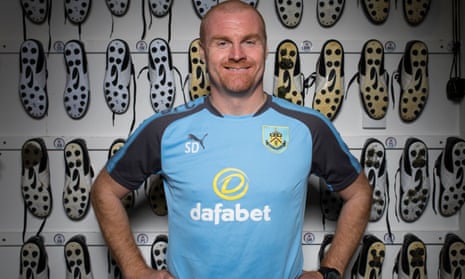After losing 2-0 at Tottenham Hotspur in midweek, we turn our attention to a Burnley team who are gaining plaudits throughout the country for their outstanding start to this Premier League season. At Brighton we are going through our first “bad patch” – with one point gained from the last five games – but we could not find a better football club than the one we face on Saturday for a case in point in terms of believing and sticking with their ethos and identity, and where the word “panic” doesn’t seem to be in their vocabulary.
In Sean Dyche, who is doing an outstanding job as manager, you can see the benefit of trust in him from the boardroom, which has allowed him to put his football and cultural stamp on Burnley in the medium and long term. Now, after being relegated and bouncing back with him at the helm only 18 months ago, they find themselves close to a Champions League spot, with nearly half of the season gone.
The credit must go to Dyche, who has built a team who mirror his footballing identity and philosophy: hard work and organisation – coupled with outstanding quality in forward areas – and with players who have been identified and recruited to fit in with the club’s overall plan.
Burnley’s rise to prominence could not have happened without complete synergy throughout filtering down from boardroom level to transfer scouting and recruitment, to coaching methods on the training pitch and then finally to executing it on the field of play. This usually only happens when complete faith is put in a manager who is invested with the power to run the club his way because he knows he has the total support to implement his process from the people upstairs.
How many other football clubs can you honestly say have the same setup and therefore a similar sense of security within their ranks? I remember playing a reserve game for Hull at Burnley’s training ground three years ago, in a season when they eventually got relegated, and what struck me was the fact that the reserve team were replicating Burnley’s style of play to the letter, with Dyche himself directing and shouting orders from the touchline to his younger players as the game went on.
It was an odd day as you could hear the builders and machinery rattling around the pitch as the training ground was being further developed, and I got the sense that the football club had a plan in every area and knew in which direction they were heading. Regardless of the short-term results of relegation there was a belief that investing in the infrastructure on and off the pitch would lead to success in the long term.
The most significant factor about having a defined identity on the pitch is that it enables a football club to replace top players easily and recruit cost‑effectively: Danny Ings, Kieran Trippier and Michael Keane have all left Burnley for bigger clubs but their trajectory has consistently been upwards in the same period because of the fact that when entering the transfer market they look at players who would fit not only into their style of play seamlessly but also understand the hard work and selflessness that Dyche demands of anyone who plays for him. Identifying and signing players is a lot easier when a club know exactly what they are looking for.
It’s no coincidence that all of these qualities stem from common sense and logic – something that the more I think about it, the more disappointed I am that they are qualities that are lacking at clubs with huge sums of money at their disposal.
In our game I see a shortsightedness and lack of forward planning when it comes to managerial appointments or dismissals, transfer spending and wages, and also the development of young players coming through our academy systems, where the style and methodology of play is the polar opposite of the first team they are trying to break into.
None of these accusations can be levelled at Burnley, who have been building their football club from the bottom up on solid foundations, with an emphasis on budget and signing players with a similar mentality and pay packet. Not to mention giving a talented manager both time and autonomy to implement his ideas in the medium and long term. It is no coincidence they are at the upper echelons of our league.
When we play them on Saturday, no matter the score, I know that we at Brighton have the same faith in Chris Hughton and faith in our long-term vision, no matter what happens this year. But it is not only us but countless other clubs who can take the example of Burnley and Sean Dyche and use it for the benefit of our game on a wider spectrum.

